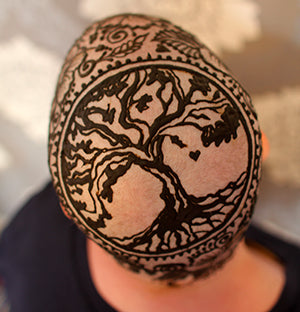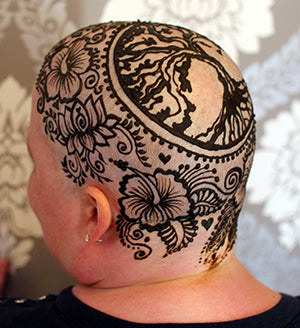Henna Crowns
|
|
For Henna Crown Services
|

|
|
|
|
|
|
Safety Precautions for you and client
* When working with immune-compromised patients it’s always advisable to request your client discuss your henna paste ingredient list with their physician before application. When a person is undergoing chemotherapy or radiation, extremely strong drugs are being used. These drugs may leach out in sweat, urine, vomit, sneezing, etc. If you are concerned about your health and exposure discuss this with the client. It may be in the artists best interest to wear gloves to protect themselves and a mask to prevent the client from illness or germs spread by the artist. Baldness may be caused by several factors:
|
|
|
Cautions and Recommendations When working with clients that are immune-compromised the gentlest ingredients should be used.
Essential oils can be extremely strong and some can cause serious burns, skin irritations or react with medications. You must be very mindful of what you use. Bulgarian or French High Altitude Lavender Essential oil is generally believed to be the most mild essential oil, and it yields great color for henna stains! Essential oils are an active ingredient in your henna paste, this is not an ingredient that should be downgraded on quality to save money - price and quality are important. Use Bulgarian Lavender essential oil with less than 3% camphor content for safety when working with cancer patients. Liquid additions to henna paste should be limited to lemon juice, water or apple juice. Coffee, tea, lime juice, grapefruit juice, etc. are not necessary or beneficial additions and in some cases can interfere with medications. Ingredients for henna crowns should be limited to:
|







